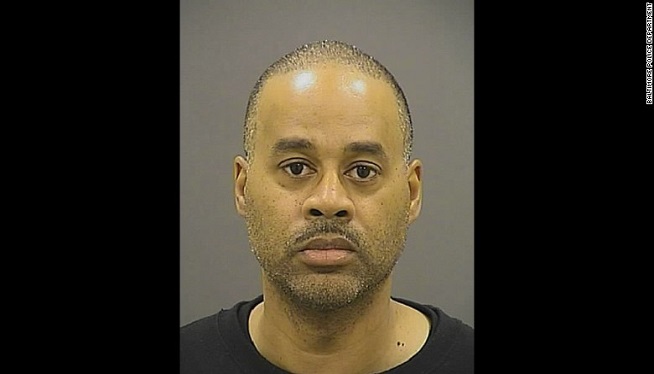WASHINGTON — (CNN) The driver of the transport van in which prosecutors say Freddie Gray suffered a fatal spinal injury took him on a “rough ride,” said the chief deputy state’s attorney.
Officer Caesar Goodson, who faces the most serious charges in a controversial case that sparked days of unrest in Baltimore, ran a stop sign and veered into another lane of traffic while making a turn because of the speed he was traveling, prosecutor Michael Schatzow said during opening statements Thursday.
Goodson bears the “ultimate responsibility” for the fate of his prisoner, Schatzow said. Gray was not wearing a seat belt when he was being transported after an arrest in April 2015.
But Andrew Graham, Goodson’s attorney, told the court his client was a good officer who followed department procedure.
Evidence of a rough ride by Goodson does not exist, Graham argued.
Gray’s injuries were caused in part by his own agitation and thrashing around in the van, the attorney said.
“Freddie Gray’s death was a tragedy,” Graham said, adding that convicting a good cop out of what he calls a desire to assign blame makes a tragic situation worse.
Goodson is the third of six officers tried in the case.
On Monday, the officer elected for a bench trial, meaning his fate will be decided by the same judge who acquitted a Baltimore officer last month on charges related to Gray’s controversial death last year.
Judge Barry Williams on May 23 acquitted Officer Edward Nero, one of three bicycle officers involved in the initial police encounter with Gray.
Before opening arguments, Williams declined a defense request to dismiss the charges against Goodson, but he blasted the state for not disclosing a meeting last year with a man who was being held in the van at the same time as Gray.
In the meeting with Dante Allen, prosecutors said no notes were taken.
Williams suggested that Schatzow did not understand the rules surrounding discovery and asked the state to take inventory of pending cases and immediately disclose any information they may be withholding.
“I’m not saying you did anything nefarious,” Williams said. “I’m saying that you don’t understand what exculpatory means.”
Goodson faces charges alleging second-degree depraved-heart murder, second-degree assault, misconduct in office, involuntary manslaughter, manslaughter by vehicles (gross negligence), manslaughter by vehicle (criminal negligence) and reckless endangerment.
CNN legal analyst Andrew Alperstein said a bench trial could help Goodson. Williams has demonstrated an ability to put aside the emotions that surrounded Gray’s death, he said.
Gray died after suffering a spinal injury during an arrest in April 2015.
Seat belt key part of opening statements
In opening arguments, Schatzow said Goodson was “no rookie, no inexperienced officer.” Goodson knew he was not in danger from Gray and should have put a seat belt on the prisoner, he said.
“Before Mr. Gray entered that vehicle, he could walk, he could run … He could bear his own weight,” he said. “After, he was fatally injured because he got in a rough ride.”
A seat belt would have saved Gray’s life, the prosecutor argued.
“The defendant had the keys to the vehicle,” Schatzow said. “No one could get in or out without him.”
Graham countered that his client didn’t commit any crime and wasn’t even involved in Gray’s arrest.
“The fact that seat belting did not occur with Mr. Gray was the norm, rather than the exception,” he said.
The defense argued that Gray kicked and banged around in the back of the van.
The prisoner injured himself in what the medical examiner initially termed a “freakish accident,” according to Graham.
The death of Gray, who was black, ignited a wave of protests as debate surged nationwide over whether police use excessive force, particularly against African-Americans.
Prosecutors have said that Gray complained of having trouble breathing and asked for medical help as he was driven in a police van.
When he arrived at a police substation, he was unconscious. A week later, Gray died at a hospital from a spinal injury.
Riots erupted in Baltimore last year after Gray’s funeral.
In December, the judge declared a mistrial after a jury deadlocked in the case of William Porter, the first officer on trial in connection with the arrest and death of Gray.
Porter is scheduled to face a new trial this year.
The verdict in the Nero case drew mostly outrage on social media but praise from police and the Gray family attorney.
Goodson was scheduled to stand trial earlier this year, but the case was delayed.
Three other officers have yet to stand trial — Officer Garrett Miller, Lt. Brian Rice and Sgt. Alicia White.
Rice’s trial will start July 5, Miller’s on July 27 and White’s on October 13. Porter is to be retried in September.
CORRECTION: An earlier version of this story incorrectly stated when Officer William Porter will be retried.
It will be in September.
The-CNN-Wire ™ & © 2016 Cable News Network, Inc., a Time Warner Company. All rights reserved.
(Photo: CNN)





















